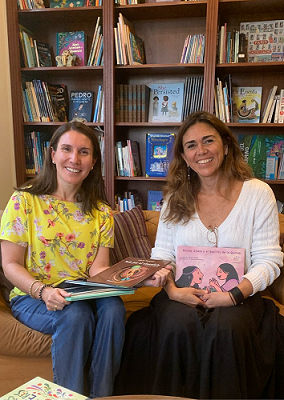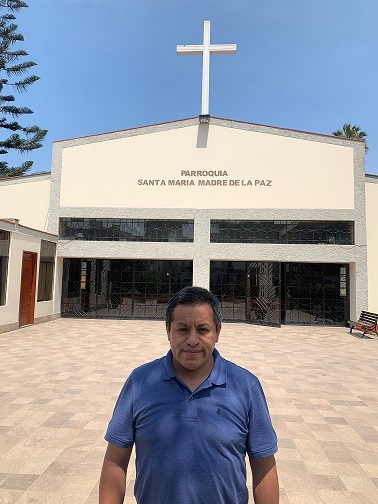In the month that marks the International Children’s and Young People’s Book Day (April 2) and International Book Day (April 23), 3Love Inc. would like to share this interview with Antoinette Arévalo and Inés Carriquiry. Together with Mariana Moreyra, they founded Cuenta Cuentos Rimana Wasi, a space of encounter between stories, storytellers and children. Through a virtual platform where children’s stories are read aloud by several talented Peruvians, small children have the possibility to approach a new and exciting world: reading.
In this conversation, Antoinette and Inés tell us what this project consists of, why they have decided to promote reading among Peruvian children, what are the advantages of reading short stories aloud to children and what literature means to them in their lives.
What does the Cuenta Cuentos Rimana Wasi project consist of?
Antoinette: Cuenta Cuentos Rimana Wasi is a platform that aims to democratize access to children’s literature. Peru is a country in which the margins of access to children’s literature are very small. And this is also reflected in the results of international exams, where 7 out of 10 children do not understand what they read. If you expose them to moderately complex texts, they do not understand what they read, so you are saying that 70% of the future of our country does not understand texts, which means that they cannot have access to information either.
Inés: Those are the primary school children and it is terrible because we see it again in high school. At 15 years old comes the PISA test and half of them do not understand what they read. It is a conversation we have had several times, that there is a lot of talk about human capital, but if that human capital does not understand what they read, we do not solve anything, because understanding a text influences all your subjects. To solve a math problem that the teacher gives you, if you don’t understand what you are reading, you don’t advance.
Antoinette: The issue of learning with children starts with the emotional connection. And that is the wonderful thing about storytelling. What we have achieved is to bring together people who, out of love and detachment, give their time to generate that space with the children, because stories ignite that space of tenderness, of connection with childhood, of magic, that place where things become possible. In the imagination everything becomes possible. They say that reality begins by dreaming it.
Inés: We saw that we cannot fix things as complex as teaching children to read or write, we would love to do it, but we are still at an early stage. So, we said: “We have to awaken that enthusiasm for dreaming and imagining”, but we saw that access is very difficult. For example, in the country there are very few libraries, especially at the municipal level, Peruvians read very little and books are expensive. And we wanted to bring that feeling that each one of us has had with our children at some point when reading a book, so that other families can have it. In addition, Antoinette had a very nice experience with children during the pandemic, which is the germ that makes all this arise.
What motivated you to create this project?
Antoinette: During the pandemic, schools were closed for two years. And given the context, there was a very high dropout rate and a lot of backwardness in the curriculum. So, what the Ministry of Education did was to ask for help from NGOs linked to education, to look for and recruit volunteers. I was one of the thousands of volunteers who participated and I was in charge of eight children. At the Ministry, they had generated a learning folder that we volunteers had in digital format and the children had it in physical format, because it had been distributed all over Peru. So, I was very happy until I said: “How can I teach a child an hour of subjects like mathematics or language on the phone?”. So, I said: “I am going to do what I do with my children, which is to read them a short story”. I would start the class looking for a short story that had something to do with that subject. So, I was seeing how the kids were connecting with the short stories and then they sent me a video of Al Gore reading the short story “Brave Irene”. I looked it up and it was part of an initiative called “Storyline Online,” where they ask Hollywood actors to tell stories. So, when I saw it, I said, “This is what I’m going to do (laughs). I’m going to ask famous people to read stories because kids, when they see these famous people are going to come in and watch it.” And once they get hooked on the short stories, there’s no escape, because you fall in love. So that’s what I did. I called Inés and Mariana, who are two people who love books like me and who also have the desire to do something for our country, we are mothers and a mother is always a mother beyond her children, it is part of your DNA. That’s how the project came about, we talked to a lot of people, who joined us.
Inés: That has been nice, to find so many people willing to give, so selflessly, their time and knowledge.
Antoinette: We feel that we have something very valuable and at the same time it has been a sum of knowledge, of people, of efforts. It is a precious experience. And now we are in a pilot phase. Last year we had a very nice experience with an advertising agency that supported us pro bono. We always thought that our objective was to reach the child and they made us realize that we cannot reach a child of 4 or 8 years old directly, because our way to make it accessible and free is digital, because children cannot have access to printed books due to the high costs they have. So, our way to get there was to create that magic triangle that was the parents or caregivers, the educators and the children. That is why we are doing this pilot with schools. We are working hand in hand with teachers and pedagogues who have put together the curriculum at the Ministry of Education, for the pedagogical use of the platform in the classroom.
Is it a platform where children can access the short stories that are read aloud? And the pilot project is so that children can listen to the short stories in class?
Inés: Yes, thanks to agreements we have been able to reach with publishers, we have permission to use their stories. And we also have these talented Peruvians who may or may not be famous, but they are all people who have an interesting life story and who contribute a lot to all the children who are going to listen to them later with some reflections on their life in a video. So, on the platform you first have a short story read and then this narrator tells you a bit of their story. And the idea is that teachers can use these videos in class through a methodological proposal in which the video is paused at some point, questions are asked, and an activity is done after the video. In other words, the idea is that, apart from exciting the children with the reading, the teacher can develop a reflection around the stories. And for that, they have helped us to adapt this to the learning standards and reading skills, so that it meets the requirements of the national curriculum.
How do you select both the storytellers and the short stories that each one reads aloud?
Antoinette: We have made a huge list. Our dream is to generate a huge embrace, a positive circle where Peruvian talent comes together in favor of the growth of our children, it is to create a space of trust through talent. There are definitely people who are much more mediatic and there are people who are not well known. However, when you listen to their life stories, they are extremely inspiring people. So, the idea we have had is to look for people in different areas of talent, knowledge or activities, sports, arts, crafts, etc., so that the children can be inspired not only through the short stories, but also through the life stories of the storytellers. Many times, we do not have people in our immediate context who can open our capacity to dream. Sometimes our context is a limiting factor. So, we believe that by opening this little door of connection, we can open the possibility for children to ask themselves: “What if I can do it too?”. And that seems to me to be a very nice thing. I think it has happened to all of us at some point that you meet someone and something moves you inside, something inspires you. Many of the important things I have found in my life have been through books, I was quiet when I was little and I always loved to read. So, I think that when immediate life does not necessarily give you the answers you are looking for, books are a wonderful way, because behind a book there is always a stuck story of someone who has wanted to solve it.
Inés: Our idea is to see books as doors through which you see a world you don’t know, something new. But it is also a mirror, because in some books you will see your story, your feelings, your emotions reflected. We have thought a lot about that and about the Peruvian context. We want to have more books by Peruvian authors. At the beginning the publishers have been providing us with some books, we have had wonderful people like Julie de Trazegnies’ family who have let us use some books that are no longer in circulation but are so wonderful. And in some cases, we would say, “This book should be read by such-and-such a person, because it connects with this person.” For example, I think the first short story that was recorded was Sofia Mulanovich’s, with the short story “The Cow That Climbed a Tree.” It’s a very inspiring story about a cow that does something that nobody was doing. And Sofia at the time did something that no girl did, so it connected with her.
Antoinette: The universe of books is wonderfully huge, but we try to move around a group of values. First is self-esteem, empowering the children, because we feel that when one can look at oneself, feel calm and give oneself a value, things begin to emerge, the little seed begins to sprout. Second, it is the love for our roots, our culture, to feel proud. Sometimes we Peruvians are like fighting bulls, because we have been taught to lower our heads. We have to look at our land, our customs, our culture and that will also generate respect for diversity, which is another of our values. We are different and that is the wonder of life, that we are different and it is in that diversity that we learn, because if we were all the same, how boring it would be.
Inés: We liked that, that they were inspiring stories. We have also been lucky enough to win a prize from the Ministry of Culture, precisely to promote Peruvian authors and Peruvian stories. And we are also aware that not everything in books has to be values, we have also talked about the pleasure of reading, that is, reading has to be fun too, because that is the first hook. So there has to be a combination between the love of reading, reading for pleasure, to laugh, to have fun and sometimes also to make you talk about topics that would not have occurred to you. As I say, reading is a door to something different and again you come back to yourself and you find that someone else may feel like you or may be so different from you, but also feels like you.
Antoinette: When Mario Vargas Llosa was asked, “What is the most important thing that has happened in your life?”, he said, “Learning to read”. He found that exhaust valve in books and I think that has happened to many of us. So, in the month of children’s literature, in the month of the book and in the month that Vargas Llosa left us, who is our only Nobel Prize winner and a person who has ignited so many things in our thinking, I think it is important to evoke him with these words, because I believe that reading opens a door to possibilities that you will not necessarily find in your immediate life.
How can children access the short stories read by the storytellers?
Antoinette: What we are doing are pilots, one at the Peru Italia school in Villa El Salvador and another at the Amiguito school in Cieneguilla. We want to reach children from 4 to 8 years old, which is the period of initiation to reading and these are the books we are focusing on for the moment. We are polishing what we have already achieved to give it another dimension, because our goal is to reach all of Peru. So, we are going little by little, that’s where we are. The experience with the children so far has been super nice, on Friday we have a workshop to put the platform into effect as a pedagogical tool. The problem is that most schools do not have books or have very basic books, so the children are not exposed to a diversity of children’s literature. So, we are opening an opportunity for them to have this encounter with the enormous diversity of literature written in Spanish and hopefully soon also written in native languages or translated into native languages, but the fact that children can listen to these short stories is already a huge step.
Why is it important to encourage the habit of reading to children through listening to stories read aloud?
Inés: We have realized that reading aloud is powerful, because it helps with pronunciation and fluency. We have realized the importance of silence, of a semicolon and a comma, so that you understand the content, so that you really understand what you are reading. And you learn that by listening to other people. That’s why it’s so important to have someone read to you, that’s how we all learn. That is why we believe that this group of children from 4 to 8 years old is fundamental. It is also very useful for teachers because it is helpful, especially if the class is already scheduled with activities. We believe that there is a niche there that we can reach and hopefully later on we will have things for teenagers. We have a lot of dreams, but we are going little by little.
On a personal level, how has reading helped you in your life, what has it taught you?
Antoinette: For me, books have been a door to find answers to things that I didn’t necessarily find in my immediate life. It has been a space to find meaning. And since I was a little girl, I always dreamed of being a writer. I was just a little shy, because I didn’t feel I was that talented. I managed to publish a collection of poems two years ago, but for me the word was always a parallel path where I could give order to what reality did not necessarily allow me to sustain. For me books are a space of freedom, of encounter, of clarity and meaning.
Inés: We all live with every character in the books, we cry with them, we laugh with them. Every time I finish a book I suffer and I still think about the characters. I can’t imagine life without stories because they move us, they inspire us, they give us audacity, they give us courage, they teach us new things. I think they are fundamental, we really learn with books, they make us who we are, each of those stories mark us and open possibilities for us.
Antoinette: Recently when Vargas Llosa passed away, I felt horrible, because as I dreamed of being a writer, I have read him a lot and he has something very Peruvian about him. I think that when you try to write you also try to find that mirror of your own identity and how you resolve your own contradictions and connect them in words. When you read, you begin to see possibilities that exceed what you are. And that’s nice because sometimes we live very closed in an identity and the universe is much bigger. I think literature, art and music allow you to expand that space from what you call “reality”, to what you call “me”.
Inés: And it allows you to see the other with a different look, with less fear, and that is what is so terrible today, with these divisions in the world, because of the fear of the other. Reading allows you to soften that, because you realize that the other may be very different from you in many ways, but in the end, we are all human and our feelings are the same. I think that only books can do that, and maybe it has happened with some movies, but the book has a much stronger power and gives us a lot of clarity of thought to be able to express ourselves and to be able to write.


